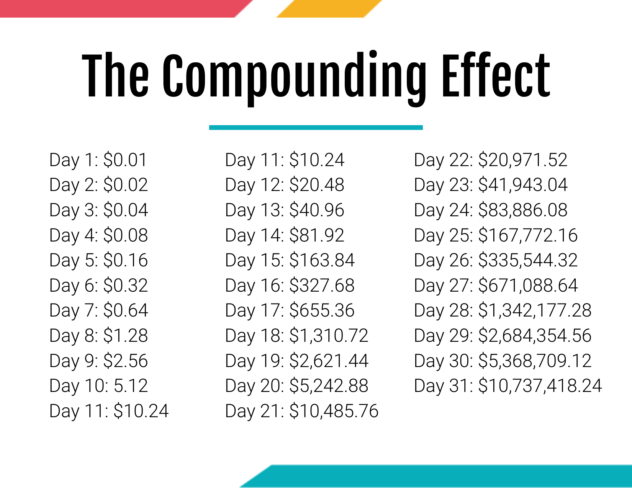Title
Ferris Bueller & The Compound Effect: What They Have in Common & Why Your Business Should Care

It’s amazing how quickly this year is already passing by. I remember being in school and hearing adults tell me to enjoy that time because when it was time to get out in the real world, it would go by so fast. Fast forward to four and a half years ago when my wife and I were about to have our first child, people gave us that exact same advice — time will go by so fast after having your first child, and once again, they were right.
As the great Ferris Bueller once said, “Life moves pretty fast, if you don’t stop and look around once in a while, you could miss it.” How unequivocally right he was that as we grow up, we realize that our most precious resource is time.
Last year at this time, I picked up the book Atomic Habits by James Clear. I was looking for a good, inspirational book that could help me grow and I read a ton of great reviews on the book. For those of you that haven’t read it, please pick up a copy or listen via audiobook, you won’t regret it.
Atomic habits refer to tiny routines and behaviors that, when built upon one another, can multiply outcomes over time. We tend to prioritize big breakthroughs over tiny improvements. However, it’s the small daily decisions and actions that really matter. According to the book, improving by 1% each day doesn’t simply result in a 365% (or 3.7x) improvement over the course of a year. Instead, due to the compounding effect, you actually become 37 times better.
The author of the book talks in depth about goals and systems, proposing that long-term change must be sustained at the system level. With the right systems in place, the results will take care of themselves. I enjoyed this section, as it makes a lot of sense to me. He acknowledges that goals are good to have, but that it’s important not to put all emphasis on achieving them. Say, for instance, that your goal for the year is to become stronger and healthier. Many of us on January 1st will join a gym and for a few weeks, be very motivated to improve our physical fitness. The problem with this is: what happens when a month goes by and you don’t see any progress? You get frustrated and convince yourself your hard work isn’t paying off, and ultimately stop pursuing physical fitness altogether. I’ve found myself in this exact circumstance many times, and the key is to form the right systems and be patient.
The Compound Effect by Darren Hardy provides a great example of this exact phenomenon. He mentions an example of having two choices: take $3 million in cash today or start with a magic penny that doubles in value each day for 31 days. I don’t know about you, but my first instinct would be to grab the easy $3 million. Wow, what I could do with that money. My guess is that I’m not alone in wanting to choose the faster route to wealth. But what makes the magic penny so magic? Yep, you guessed it: the compound effect. It doesn’t seem alluring at first, but the magic penny doubles every day and accumulates much more than $3 million … (see graph below)

At day 10, I would be thinking I made the biggest mistake of my life. I left $3 million on the table for $5.12. It wouldn’t be until day 30 that the compounding magic would take place. I would have over $5 million, with over $10 million after day 31. I’m no math major, but over $10 million is much more than $3 million (someone check my math). The reason I love this compound effect example so much is it shows how small changes can make such a difference over time.
This makes me think about companies and the internal processes they use every day. For instance, the credit department’s goals might include reducing their days sales outstanding, strengthening customer relationships, and increasing staff efficiency. The key is to examine a company’s processes and determine whether they have a system in place for building the right habits every day. For example, the customer service department may aim to reduce the time spent processing incoming sales orders and minimize errors, and the accounts payable department might have goals focused on reducing the time spent paying invoices and taking advantage of early payment discounts.
These companies may believe their current process is working, there may be something out there to help them improve performance, establish better habits for their staff, and implement a better system that enables them to achieve their goals — all while enjoying their jobs more and freeing up time to tackle other tasks.
At Esker, we are fortunate to offer a full suite of solutions for both the Source-to-Pay and Order-to-Cash cycles. If you feel performance can be improved in your respective department and would like to learn how other companies are using automated software to help grow their business, feel free to reach out to us. We can dive into what we have to offer and how our solutions can help you achieve your specific business goals. This might be the best decision you make in 2023. By having the ability to build better habits with a system that improves each day, you could be making one of the most beneficial decisions for your business this year and beyond.
Ferris was right, life does move pretty fast. What can you do to maximize each day?
Subscribe to new posts
